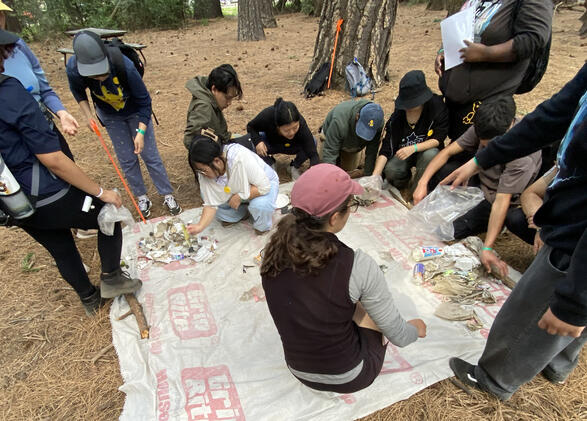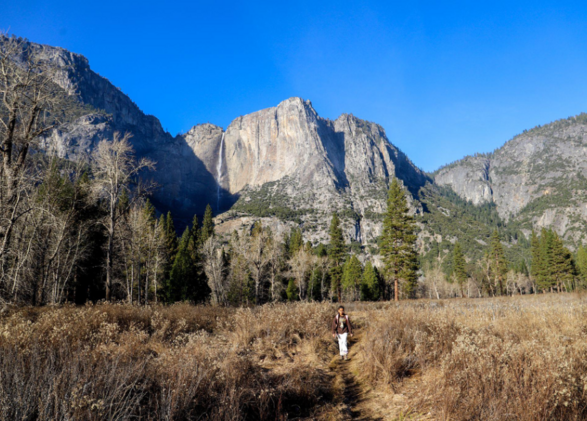A Day in the Field with Marley

I arrived for my very first field day at our Golden Gate campus on a dry and sunny March morning and quickly found myself in the prep room alongside 12 NatureBridge educators filling extra water bottles for the trail, drawing maps for the day’s hike, gathering lunch items and finishing the last of their morning coffee and breakfast. Discussions floated between who last had the keys to the lighthouse and potential whale sightings (early for the time of year) as I began to meet several of my fellow coworkers.
Adapting: The Theme of the Day #
It didn’t take long for me to meet Marley, the educator who I was lucky enough to spend the day shadowing. Warm and welcoming, she wasted no time showing me the ropes.
Walking out of the prep room, the grassy quad between the dining hall and dormitories buzzed with middle schoolers and teacher chaperones. It was the first full day of the Environmental Science program in the Golden Gate National Recreation Area for the Soulsbyville Elementary School sixth graders. Marley briefly met with the two teacher chaperones of her group to explain the plan for the day ahead. Shortly after, she greeted her 12 students and had them all meet at a grassy spot just behind the dorms.
The morning began with several warm up activities, an explanation of the day’s itinerary and an ultimate game of rock-paper-scissors to determine who would be “map maven” for the day. She then introduced the day’s theme of “adapting.” Each time Marley introduced a new word or concept to her students, she would pause to ask the group what they thought it might mean.
She spent several minutes listening to the ideas of the students and then rather than just explaining what it meant, holding an open conversation about the word. She positively responded to each answer, always asserting that she could see how that student got to their answer. After some more discussion, the general consensus was that adapting could mean many things. It can be applied to people, plants, animals and nature, which was exemplified in Marley’s lessons throughout the day.
Experiential Learning #
One of my favorite teaching moments came when we stopped at the top of a small trail overlooking Rodeo Beach to discuss plant adaptation. The focus was on the coastal succulent shrub iceplant. Marley explained how iceplant adapts to its surroundings by absorbing water from the ground and holding onto it for long periods of time. This allows iceplant to stay healthy and green, even during a drought! She then encouraged students to pick off a piece of iceplant and hold it against their tongues. Through experiential learning, students were able to witness how the iceplant absorbed the moisture from their own tongues, leaving them temporarily quite dry.
Though it adds character to the trails, iceplant grows so fast and thick, it hinders the growth of several other native plants, making it an invasive shrub throughout much of California. However, shallow roots enable it to be managed by hand, allowing for a fun, hands-on stewardship activity that helps the National Park Service. After providing this explanation, Marley introduced her group of sixth graders to “the most fun volunteer project they’ll ever participate in.”
With parent chaperones at the bottom of the hill, students took turns rolling down over the iceplant to help control its growth. The laughter and excitement that ensued merely enhanced the lesson for these students.
Before continuing on our hike, Marley encouraged her group to drink some water. She called for a “water toast,” asking each of the students what they’d like to cheers to. Never missing an opportunity to turn something into a teachable moment, Marley closed with, “Cheers to clean water, it’s a privilege to have.”
The day continued like this: At each stop there was an interactive game or activity that ultimately led to thought-provoking conversations amongst the group. It was immediately clear how Marley’s enthusiasm and knowledge impacted the students, constantly stirring an excitement and curiosity for the natural world around them.
Marley’s teaching style is the essence of outdoor learning. She is patient, engaging and knowledgeable. She demonstrates rather than lectures and effectively provides the tools and information to promote self-learning and self-actualization among her students. Marley is able to connect with her students, adapting to their levels of energy and knowledge to make science-learning fun.
Learn more about Marley in this recent Educator Spotlight Q&A!
Claire Martin joined NatureBridge in February 2019. She is based in NatureBridge's national office in San Francisco and looks forward to visiting every NatureBridge campus and meeting the incredible educators in the field.












